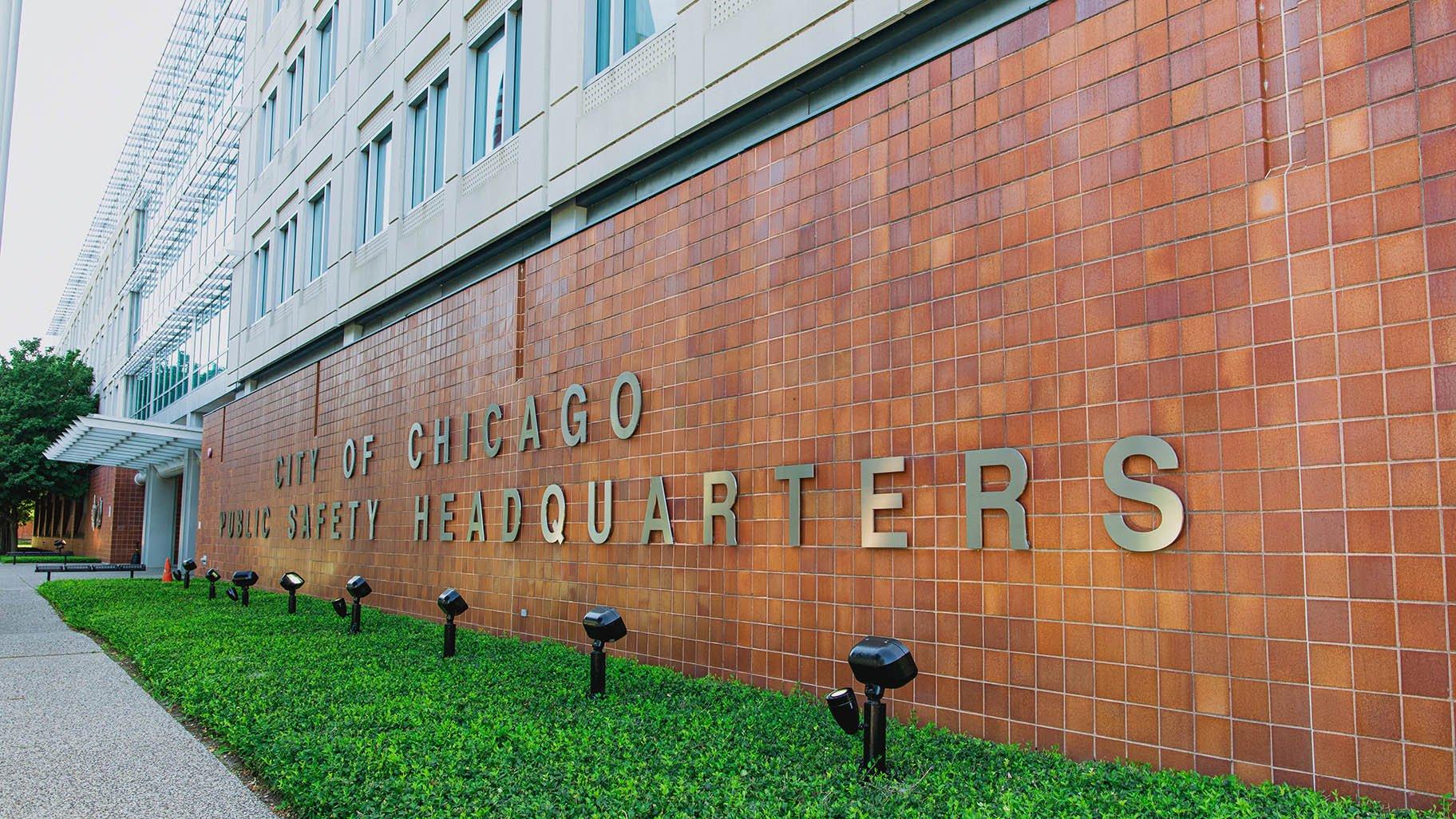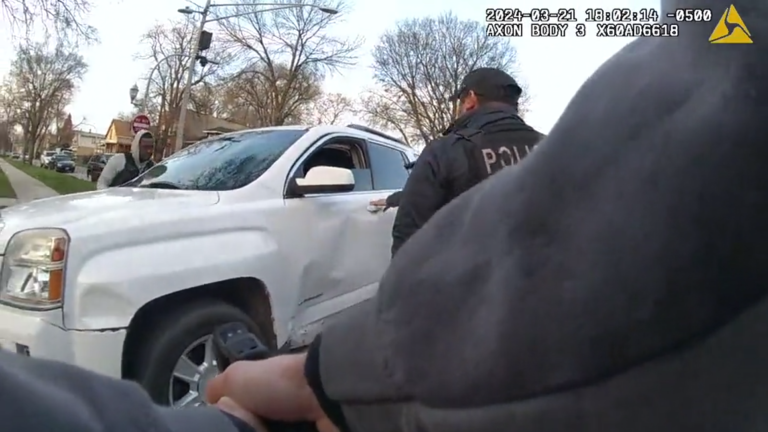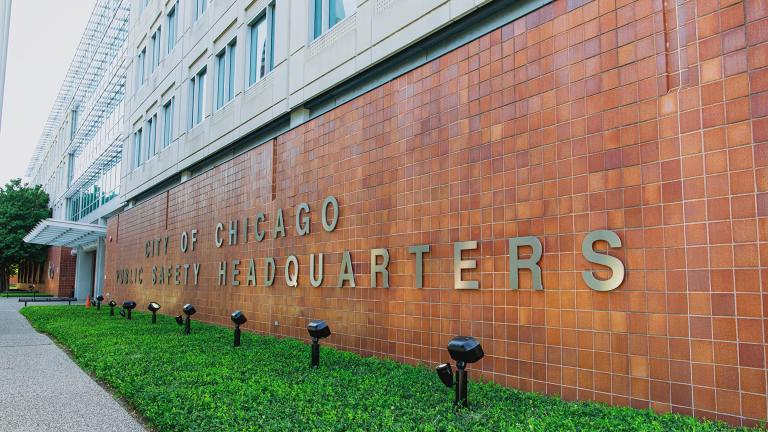 Chicago Police Department Headquarters, 3510 S. Michigan Ave. (Michael Izquierdo / WTTW News)
Chicago Police Department Headquarters, 3510 S. Michigan Ave. (Michael Izquierdo / WTTW News)
Chicago police officers accused of serious misconduct have the right to ask an arbitrator — and not the Chicago Police Board — to decide their fate, but those proceedings must take place in public, a Cook County judge ruled Thursday.
Judge Michael Mullen’s decision, which is subject to appeal, upholds the effort backed by the city’s largest police union to upend the system used for 60 years to punish officers.
However, Mullen found that allowing cases that could allow officers to be fired or suspended for more than a year to take place behind closed doors goes “against a dominant and well-defined public policy.” In addition, Mullen’s ruling allows police brass to continue to suspend officers facing serious discipline without pay until their cases are resolved.
“Police Board hearings have been open to the public for the last 60 years and no evidence was cited to any negative consequences of the open nature of the proceedings,” Mullen ruled, rejecting a request from the police union to force the city to pay its legal fees.
If upheld, Mullen’s decision would require city officials to set up an entirely new system to decide the most serious cases of police misconduct and could gut the power of the Chicago Police Board, which is now responsible for deciding those cases. It is also retroactive to September 2022, which would force an arbitrator to reconsider all Police Board decisions made since that date.
Mullen cited the consent decree, a federal court order requiring the Chicago Police Department to change the way it trains, supervises and disciplines officers, as the basis for his ruling that discipline hearings must not take place behind closed doors.
The consent decree also requires city officials to increase transparency in matters of police accountability, and the city must abide by that order, Mullen ruled.
“There clearly is an extraordinarily strong public policy interest in favor of transparency in cases alleging serious misconduct by Chicago Police officers serious enough to result in dismissal or suspension in excess of one year,” Mullen ruled. “Police officers differ from other public and private employees in one crucial respect: they are empowered to arrest and, when necessary, employ lethal force against other citizens.”
Chicago Police Board President Kyle Cooper called the decision “disappointing.”
“While it is reassuring that any such arbitrations will be open to the public, police accountability will nevertheless suffer by having the most serious disciplinary cases decided by individual arbitrators who are not required to live in Chicago or undergo the extensive training required by the consent decree,” Cooper said in a statement.
Mullen rejected a request from the city to order arbitrators eligible to decide cases of serious misconduct to undergo the same training required by Police Board members.
John Catanzara, the president of the Fraternal Order of Police, Lodge 7, told WTTW News “we are weighing our options.”
A representative for the city’s Law Department said officials are “pleased that Judge Mullen’s decision recognizes the necessity and strong public policy in favor of transparency, particularly for police misconduct cases resulting in terminations or lengthy suspension.”
The Chicago City Council has voted twice since December to reject a decision by an arbitrator made during negotiations over the city’s labor agreement with the Fraternal Order of Police, Lodge 7, that found officers facing termination or a suspension of at least a year have the right to choose not to have their cases decided after a public hearing in front of the police board, which is made up of mayoral appointees confirmed by the City Council.
It is unlikely that few, if any, officers would decide to give the Chicago Police Board the final say rather than an arbitrator, who must be appointed with the blessing of union leaders.
The Chicago Police Board holds its meetings in public and allows input from Chicagoans, while arbitrations traditionally take place behind closed doors and are not open to public scrutiny.
The dispute prompted Mullen to block the Police Board from weighing in on whether to fire Chicago Police Officer Eric Stillman for shooting and killing 13-year-old Adam Toledo after a brief foot chase in March 2021 as scheduled, sending Stillman’s case into limbo along with nearly 20 other cases.
After the City Council’s December vote rebuking his decision, arbitrator Edwin Benn was defiant and refused to reverse that decision, sending the matter back to the City Council. Benn warned the City Council it was wasting taxpayer money and urged alderpeople to reverse course.
“Now please don’t throw away potentially large sums of taxpayer money that could be used better elsewhere than on a legal fight you cannot win which you are undertaking to make a point that you have already made,” Benn wrote.
Contact Heather Cherone: @HeatherCherone | (773) 569-1863 | [email protected]








